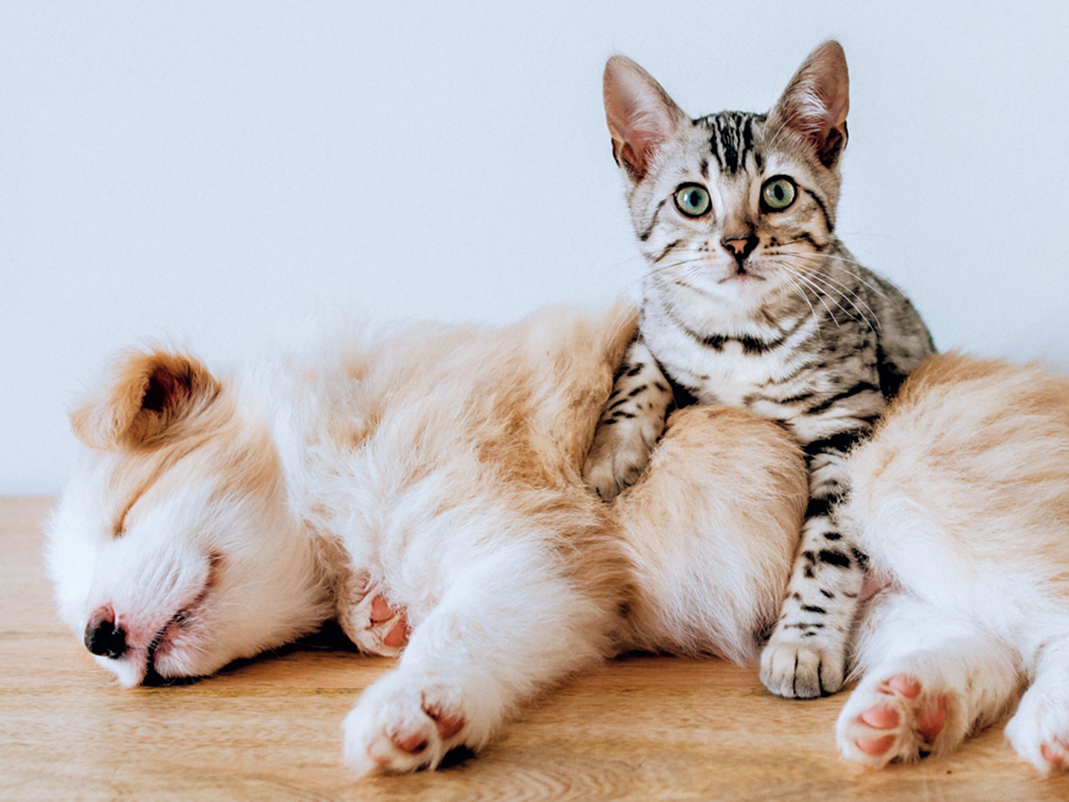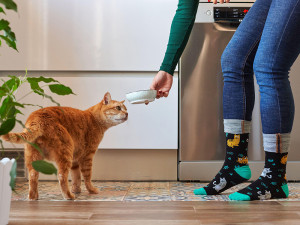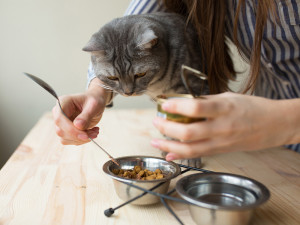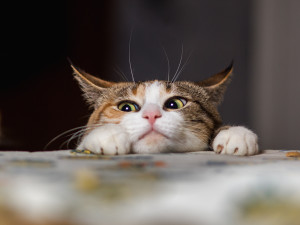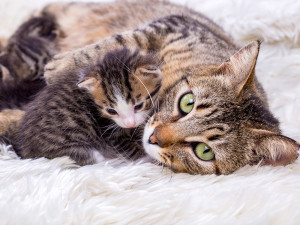Why Is Your Cat Always Hungry?
Really, dude?
In This Article:
Why Is My Cat Eating More Than Usual and Hungry All The Time? Why Is My Cat Constantly Hungry?: Medical Reasons Why Is My Cat Always Hungry?: Other Reasons
Cats are notoriously good at telling time, especially when it gets close to chow time. And many cats err on the side of always running a few hours early, hoping that if they start pawing at your face and meowing in your ear before the sun comes up, they might get an early breakfast. This obsession with never wanting to miss a meal can lead cat parents to believe nearly all cats are hungry all the time. When it comes to sorting out normal levels of cat hunger versus cats that are showing signs of more intense hunger, there are some important distinctions to note.
Cats who are truly showing signs of an increased appetite accompanied by other signs like weight loss or weight gain, changes in their activity level, or other physical signs of illness are more likely to have a medical condition that is affecting their appetite. Other times, cats may obsess about food and meal times for behavioral reasons.
Check out customizable policies from our friends at Lemonade Pet Insurance—so you only pay for what you need.
To get to the bottom of what’s going on with your cat, make sure to have your vet do a thorough exam and diagnostic tests to rule out the more serious medical conditions that could cause a ravenous appetite. Read on to learn more about the signs that your cat’s hunger is extreme and some of the most common explanations.
How much do you spend on your pet per year?
Why is my cat eating more than usual and hungry all the time?
Cats always seem to know when meal time is approaching, and most cats rush to their bowl the instant it’s refilled, so how would you know if your cat is actually hungrier than usual? You may notice that your cat is sitting by their food bowl in between meal times, meowing or begging for food at unusual times even after they’ve been fed, stealing food from other pets or humans, or even trying to eat things that aren’t edible. These can be signs that your cat is feeling more hungry than usual. If your cat is actually eating more, too, you’ll have a more objective way to measure their appetite and hunger. Changes in appetite can happen for many different reasons, so it is important to look for other clues in your cat’s physical health and behavior to pinpoint what’s going on.
If your cat’s increased appetite is accompanied by a dramatic shift in their weight or other physical changes like vomiting, increased thirst, increased urination, or diarrhea, these are more clues to an underlying medical problem. It is a good idea to see a vet anytime you notice a dramatic change in your cat’s appetite in order to rule out common medical causes first. If your cat has a clean bill of health, there may be behavioral explanations for their increased appetite that are worth exploring too.
Why is my cat constantly hungry?: Medical reasons
There are many medical conditions that can cause your cat to have an increased appetite and act like they are hungrier than normal. This includes:
Hyperthyroidism in cats: Hyperthyroidism is a condition where cats develop an overgrowth of the thyroid gland that produces an excess of thyroid hormone. These cats tend to be constantly hungry, experience dramatic weight loss, vomit frequently, and are more active and vocal, especially at night.
Parasites: Intestinal parasites absorb nutrients from cats’ digestive tracts, depriving cats of many essential elements of their diet. These cats may feel more hungry as their body tries to compensate for nutritional deficiencies by eating more.
Diabetes in cats: Diabetes mellitus is caused by a lack of insulin or resistance to insulin, preventing cells from taking up glucose, a sugar, to use for energy. As a result, cells can enter a starvation mode where they use alternative energy sources like protein or fat. This can result in cats feeling hungry all the time while losing weight, drinking more water, and urinating more than normal.
Pregnancy: This one may seem obvious but sometimes a change in appetite is an early sign of pregnancy in cats. If you have a female cat that is not spayed and she has been around male cats, keep this in mind. As a cat’s pregnancy progresses, her belly will start to grow bigger and rounder and her appetite will increase as she works to provide nutrients to her growing babies.
Pancreatic disease: The pancreas is responsible for making important enzymes that help in the breakdown and digestion of food. Cats with exocrine pancreatic insufficiency (EPI) do not make enough of these enzymes. As a result, much of their food is not properly digested and they are unable to absorb all the nutrients from a meal. This results in increased hunger, weight loss, and very large bowel movements containing undigested food.
Inflammatory bowel disease (IBD): Cats with inflammatory bowel disease have a lot of inflammation within their digestive tract which also prevents normal absorption of nutrients from their food. They may be more likely to vomit and/or have diarrhea as well. These cats often lose weight and may have an increased appetite if they are trying to replace nutrients that their body is not absorbing. Some cats also experience a decreased appetite as a result of nausea or pain related to inflammation and indigestion.
Cancer: Many forms of cancer can cause a syndrome in which cats lose weight despite eating. This may be due to changes in metabolism, decreased absorption of nutrients, or eating fewer calories per meal despite acting hungry.
Pica: Pica is a condition where cats have an increased appetite and try to eat non-food items. This can have underlying medical causes such as nutritional deficiencies or anemia, or it can be a behavioral condition.
Why is my cat always hungry? Other reasons
If medical causes have been ruled out and your cat is physically healthy but just seems obsessed with food, there may be other explanations including:
Poor quality food: If your cat’s diet is not providing enough protein, fat, or other vital nutrients, they may not feel satisfied even after eating a reasonable quantity of food. It is especially important to pay attention to the nutrient profile of cat food if you have a growing kitten, a pregnant or lactating cat, or a cat with specific nutritional needs. All cats need to eat a complete and balanced cat food diet to meet their unique needs as carnivores and to ensure they feel satisfied after eating.
Competition over food: If you have multiple cats, or even multiple pets of any kind, it is important to ensure everyone gets their own food and has a secure opportunity to eat their fill. Otherwise, some pets may bully others out of their food and prevent them from eating enough. If you notice competition or food stealing between your pets, be sure to separate them during meal times and keep a close watch to ensure everyone eats their own portion of food.
Infrequent meals: Cats usually do best when offered small, frequent meals throughout the day. If your cat is only fed once or twice a day, they may feel hungry in between the longer stretches. You can use puzzle feeders or timed feeders to offer your cat small meals throughout the day even if you are out of the house for many hours.
Boredom or loneliness: Cats are fierce predators and if they didn’t live in your house, they’d spend most of their time hunting for prey. This is important to keep in mind as life indoors can get boring, especially if they spend a lot of their time being sedentary or alone. Cats need daily physical and mental enrichment to fill their time, stay physically fit, and keep their minds sharp. When cats become bored or lonely, they may develop unhealthy behaviors like over-grooming, avoiding socialization, overeating, or becoming destructive.
Stress: Some cats also overeat due to stress. This can include stressful events like moving, construction in a home, or the introduction of new pets or people. It can also include competition between pets for food and may result in cats gorging themselves on food or vomiting if they eat too quickly.
When to seek expert help
If there is a sudden change in your cat’s appetite, whether that’s an increase or decrease, it is important to see a vet right away. There are many medical causes for changes in appetite and your vet will want to investigate the likely culprits right away to prevent more serious complications. Diseases like hyperthyroidism and diabetes often require medication to control them and routine monitoring. Even if you suspect a behavioral cause as the culprit, your vet can be a very helpful resource for addressing behavioral problems, recommending behaviorists or trainers in your area, and prescribing medication if needed.
The bottom line:
An increased appetite can be the first sign of many health problems for cats, especially if it is accompanied by other physical changes.
It is important to see a vet whenever your cat has a sustained change in their appetite or other signs of physical illness.
There are also behavioral reasons for an increase in appetite and it is important to treat these properly to ensure your cat feels content and safe.
References
Delgado, M, et al. “Feeding Cats for Optimal Mental and Behavioral Well-beingopens in new tab.” Veterinary Clinics of North America Small Animal Practice, vol. 8, no. 50, 8 July 2020, pp. 939-953.
“How often should you feed your cat?opens in new tab” Cornell College of Veterinary Medicine, Edited 2024.
Steiner, J. “Exocrine Pancreatic Insufficiency in Dogs and Catsopens in new tab." MSD Veterinary Manual, Modified September 2024.

